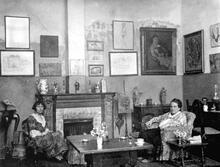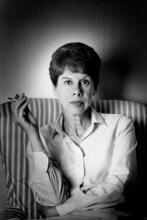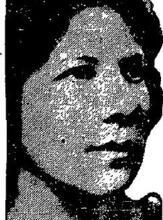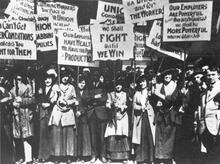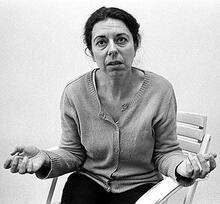Rose Gollup Cohen
Rose Gollup Cohen immigrated to the United States in 1892 and worked in garment factories, eventually joining a union. She left factory work and briefly became a domestic servant before falling ill. Her health problems brought her into the orbit of the well-known nurse and settlement worker Lillian D. Wald, who referred her in 1897 to a cooperative shirtwaist factory run by Leonora O’Reilly. While her time at the factory was brief, O’Reilly made Cohen her teaching assistant when she began teaching at the Manhattan Trade School for Girls in 1902. Cohen also attended and later found work at a summer camp in Connecticut for poor children from New York’s Lower East Side. After marrying and having a daughter, Cohen stopped working and took classes at the Rand School. She published several short stories between 1918 and 1922. Her 1918 autobiography, Out of the Shadow, was praised by the New York Times and translated into French and Russian.
Rose Gollup Cohen was the author of a 1918 autobiography detailing her childhood in Russia, immigration to the United States, and life on New York City’s Lower East Side. Out of the Shadow offers one of the richest accounts of the experience of a Russian Jewish immigrant woman at the turn of the century.
Early Life
Rose Gollup Cohen, born on April 4, 1880, was the daughter of Abraham (Avrom), a tailor, and Annie Gollup. The oldest child in her family, she grew up in a small village in what is today Belarus. The onset in the 1880s of attacks on Jewish communities and the expulsion of Jews from numerous Russian towns and cities made life increasingly intolerable for the Jewish minority and contributed to the exodus of about two million Russian Jews between 1880 and 1914.
The Gollup family was part of this massive immigrant flow. As was common in the period, Rose’s father migrated first in 1890, leaving his family behind. He worked and got a foothold for himself in New York City, and after a year and a half sent two prepaid steamship tickets to his family. In 1892, Rose and her unmarried aunt, Masha, joined him. A year later, her mother, two brothers, and two sisters followed.
Work and Lillian Wald
Cohen provides a detailed view of sweatshop garment work. She recounts union organizing among the men of her shop, her attendance at a mass union meeting, and joining a union, probably the United Hebrew Trades. After the arrival of her mother and siblings, her story continues with accounts of a brief stint as a domestic servant, her rejection of a prospective suitor, and increasing health problems. During one illness, she was visited by the noted settlement worker Lillian Wald. Through the settlement, she was referred to the uptown Presbyterian Hospital, and there she met wealthy non-Jews who sponsored summer outings for children of the Lower East Side. She worked successive summers at a Connecticut retreat established for immigrant children and, like others, found herself torn between the immigrant world of her family and broader American culture.
Wald helped the young Rose Gollup in yet another way, by referring her in 1897 to a cooperative shirtwaist shop under the direction of Leonora O’Reilly, later a board member of the National Women’s Trade Union League. That work proved short-lived, but when O’Reilly began teaching at the Manhattan Trade School for Girls in 1902, she recruited Rose Gollup as her assistant.
Later Life and Legacy
Little is known about Cohen’s later life. She married Joseph Cohen and stopped working when her daughter, Evelyn, was born. She continued her education after marriage, attending classes at Breadwinners’ College at the Educational Alliance and the Rand School, there coming under the influence of Joseph Gollomb, a Russian Jewish immigrant novelist.
In addition to her autobiography, Cohen wrote five short pieces published in New York literary magazines between 1918 and 1922. Her writing was received enthusiastically by contemporaries. Reviews in The Outlook and the New York Times were glowing. Lillian Wald and Leonora O’Reilly both praised the work as well. The book appeared in two European editions, French and Russian. A short story, “Natalka’s Portion,” was reprinted six times, including in the prestigious Best Short Stories of 1922. In addition, in the summers of 1923 and 1924 Cohen attended the MacDowell Colony in Peterborough, New Hampshire. There she met the American impressionist painter Lilla Cabot Perry and the poet Edwin Arlington Robinson.
Cohen's tragic death in 1925 at age forty-five under uncertain circumstances led Anzia Yezierska to write a thinly veiled short story about her that ended in suicide. We may never know how she died, but her autobiography survives as Rose Gollup Cohen’s legacy, a moving account of a cultural journey shared with many other Russian and Eastern European Jewish immigrant women at the turn of the twentieth century.
Selected Works by Rose Gollup Cohen
“My Childhood Days in Russia.” Bookman (August 1918): 591–608.
Out of the Shadow (1918. Reprint 1995).
“To the Friends of ‘Out of the Shadow.’” Bookman (March 1922): 36–40.
Cohen, Rose Gollup. Letter to Lilla Cabot Perry. November 12 [?]. Perry Family Papers. Colby College Library, Waterville, Maine.
Dublin, Thomas. Introduction to Out of the Shadow, by Rose Gollup Cohen (1995).
MacDowell Colony. Annual Reports (1923, 1924).
National Archives. U.S. Federal Manuscript Census of Population (1900). Microfilm T623, reel 1084, enumeration district 82, sheet 9.
O’Reilly, Leonora. “Rahel and ‘Out of the Shadow.’” Life and Labor (May 1919): 103–105.
Yezierska, Anzia. “Wild Winter Love.” Century Magazine 113 (February 1927): 485–491.


